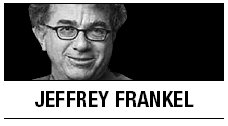CAMBRIDGE ― Greece and Italy, desperate after their gridlocked political systems left them mired in debt and crisis, have both chosen technocratic economists ― Lucas Papademos and Mario Monti, respectively ― rather than politicians to lead new governments. Both can be described as professors: Monti has been president of Milan’s Bocconi University as well as a European commissioner, and Papademos has been my colleague at Harvard’s Kennedy School of Government in the year since he finished his term as deputy governor of the European Central Bank.

Not long from now, both men will most likely provoke headlines such as the following: “Professors Earn ‘A’ in Economics, but Flunk Politics.” That will be unfair. It is not a lack of political ability which will stymie them, but rather a lack of political power.
Monti, despite strong popular support for his technocratic government, does not have a parliamentary majority upon which he can rely. Meanwhile, former Prime Minister Silvio Berlusconi has made it clear that he will not set aside his personal political interests for the good of the country.
Papademos has been dealt an even weaker hand. Despite his best efforts to insist on a term longer than three months and the ability to appoint some members of his cabinet as conditions for accepting the premiership, in the end he won neither demand.
The elevation of these two outstanding civil servants comes after a period when other professors have been squeezed out by the political process. In June, several well-qualified economists from emerging-market countries were passed over in the selection of a successor to Dominique Strauss-Kahn as managing director of the International Monetary Fund.
In Germany, Axel Weber resigned as president of the Bundesbank and member of the Governing Council of the ECB last January, reportedly because his statements opposing the banks’ purchases of troubled eurozone countries’ bonds reflected his political naivety. The press could not imagine that a technocrat might voluntarily relinquish a sure shot at a position of great power ― successor to Jean-Claude Trichet as ECB President ― on a matter of principle.
But that is precisely what Weber did. The willingness to give up power if necessary is one of the advantages that professors bring to such positions. (The ECB presidency then went to another economist and technocrat, Mario Draghi, who is, in fact, the perfect man for the job.)
It is a mistake to conflate technocratic elites (those with PhDs or other advanced economics degrees) with other kinds of elites (those with money or power, especially if they inherited one or the other). Most economists understood the downside risks of European monetary union. It was the politicians who underestimated the technical difficulties when they opted for monetary integration.
It goes without saying that academic or technical expertise is neither necessary nor sufficient to ensure government officials’ success. Indeed, many of my Harvard colleagues would make terrible policymakers, owing to a lack of leadership, managerial, or other interpersonal skills. And many excellent political leaders ― for example, George Washington and Dwight Eisenhower, among U.S. presidents ― have not been intellectuals.
Technocrats can play a useful role as honest brokers when traditional politicians have become discredited or parties are deadlocked. Moreover, they have the credibility that comes with a lack of desire to be reelected, either because their term in office has been limited in advance or because they are known to prefer a quiet academic life.
Their most obvious advantage is apparent when a country faces problems ― for example, proposing economic reforms or negotiating loan terms ― that are largely technical. A good precedent in Italy is Carlo Ciampi, who took the reins of government in 1993, after Italy was forced to drop out of the European Exchange Rate Mechanism, and managed to repeal the scala mobile (the wage-indexation system), beat down inflation, and re-board the train of European monetary integration.
Among some technocrats’ obvious disadvantages are lack of managerial experience, lack of perceived legitimacy, and lack of a domestic power base. Monti and Papademos both have managerial experience and, for now, legitimacy. They will be limited, however, by their inability to command the stable support of a political bloc.
Several current heads of state could be considered technocrats: President Felipe Calderon of Mexico, President Sebastian Pinera of Chile, and President Ellen Johnson Sirleaf of Liberia, among others. Nobody could accuse them of having led sheltered lives, or of being unaccustomed to making difficult decisions. At the same time, all three received academic training at Harvard. (Calderon took three courses from me; unfortunately, dealing with violent drug lords was not on my syllabus.)
Having good international credentials is not always an advantage. When Sirleaf received the Nobel Peace Prize in 2011, there was speculation that her good image abroad could hurt her campaign for reelection at home. Analogously, both Papademos and Monti are certified European Union and eurozone elites, which will help them to obtain support for their countries abroad, but will leave them vulnerable to domestic charges that they are lackeys of foreign powers.
It is fitting that Rome and Athens, the two seats of classical Western civilization, have turned to these two urbane, erudite men for leadership. But neither Papademos nor Monti can work any technocratic magic if they are not given the political tools to get the right policies enacted.
By Jeffrey Frankel
Jeffrey Frankel is professor of capital formation and growth at Harvard University. ― Ed.
(Project Syndicate)

Not long from now, both men will most likely provoke headlines such as the following: “Professors Earn ‘A’ in Economics, but Flunk Politics.” That will be unfair. It is not a lack of political ability which will stymie them, but rather a lack of political power.
Monti, despite strong popular support for his technocratic government, does not have a parliamentary majority upon which he can rely. Meanwhile, former Prime Minister Silvio Berlusconi has made it clear that he will not set aside his personal political interests for the good of the country.
Papademos has been dealt an even weaker hand. Despite his best efforts to insist on a term longer than three months and the ability to appoint some members of his cabinet as conditions for accepting the premiership, in the end he won neither demand.
The elevation of these two outstanding civil servants comes after a period when other professors have been squeezed out by the political process. In June, several well-qualified economists from emerging-market countries were passed over in the selection of a successor to Dominique Strauss-Kahn as managing director of the International Monetary Fund.
In Germany, Axel Weber resigned as president of the Bundesbank and member of the Governing Council of the ECB last January, reportedly because his statements opposing the banks’ purchases of troubled eurozone countries’ bonds reflected his political naivety. The press could not imagine that a technocrat might voluntarily relinquish a sure shot at a position of great power ― successor to Jean-Claude Trichet as ECB President ― on a matter of principle.
But that is precisely what Weber did. The willingness to give up power if necessary is one of the advantages that professors bring to such positions. (The ECB presidency then went to another economist and technocrat, Mario Draghi, who is, in fact, the perfect man for the job.)
It is a mistake to conflate technocratic elites (those with PhDs or other advanced economics degrees) with other kinds of elites (those with money or power, especially if they inherited one or the other). Most economists understood the downside risks of European monetary union. It was the politicians who underestimated the technical difficulties when they opted for monetary integration.
It goes without saying that academic or technical expertise is neither necessary nor sufficient to ensure government officials’ success. Indeed, many of my Harvard colleagues would make terrible policymakers, owing to a lack of leadership, managerial, or other interpersonal skills. And many excellent political leaders ― for example, George Washington and Dwight Eisenhower, among U.S. presidents ― have not been intellectuals.
Technocrats can play a useful role as honest brokers when traditional politicians have become discredited or parties are deadlocked. Moreover, they have the credibility that comes with a lack of desire to be reelected, either because their term in office has been limited in advance or because they are known to prefer a quiet academic life.
Their most obvious advantage is apparent when a country faces problems ― for example, proposing economic reforms or negotiating loan terms ― that are largely technical. A good precedent in Italy is Carlo Ciampi, who took the reins of government in 1993, after Italy was forced to drop out of the European Exchange Rate Mechanism, and managed to repeal the scala mobile (the wage-indexation system), beat down inflation, and re-board the train of European monetary integration.
Among some technocrats’ obvious disadvantages are lack of managerial experience, lack of perceived legitimacy, and lack of a domestic power base. Monti and Papademos both have managerial experience and, for now, legitimacy. They will be limited, however, by their inability to command the stable support of a political bloc.
Several current heads of state could be considered technocrats: President Felipe Calderon of Mexico, President Sebastian Pinera of Chile, and President Ellen Johnson Sirleaf of Liberia, among others. Nobody could accuse them of having led sheltered lives, or of being unaccustomed to making difficult decisions. At the same time, all three received academic training at Harvard. (Calderon took three courses from me; unfortunately, dealing with violent drug lords was not on my syllabus.)
Having good international credentials is not always an advantage. When Sirleaf received the Nobel Peace Prize in 2011, there was speculation that her good image abroad could hurt her campaign for reelection at home. Analogously, both Papademos and Monti are certified European Union and eurozone elites, which will help them to obtain support for their countries abroad, but will leave them vulnerable to domestic charges that they are lackeys of foreign powers.
It is fitting that Rome and Athens, the two seats of classical Western civilization, have turned to these two urbane, erudite men for leadership. But neither Papademos nor Monti can work any technocratic magic if they are not given the political tools to get the right policies enacted.
By Jeffrey Frankel
Jeffrey Frankel is professor of capital formation and growth at Harvard University. ― Ed.
(Project Syndicate)












![[Today’s K-pop] BTS pop-up event to come to Seoul](http://res.heraldm.com/phpwas/restmb_idxmake.php?idx=644&simg=/content/image/2024/04/17/20240417050734_0.jpg&u=)




![[KH Explains] Hyundai's full hybrid edge to pay off amid slow transition to pure EVs](http://res.heraldm.com/phpwas/restmb_idxmake.php?idx=652&simg=/content/image/2024/04/18/20240418050645_0.jpg&u=20240419100350)

![[Today’s K-pop] Zico drops snippet of collaboration with Jennie](http://res.heraldm.com/phpwas/restmb_idxmake.php?idx=642&simg=/content/image/2024/04/18/20240418050702_0.jpg&u=)